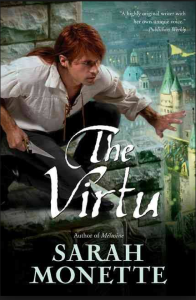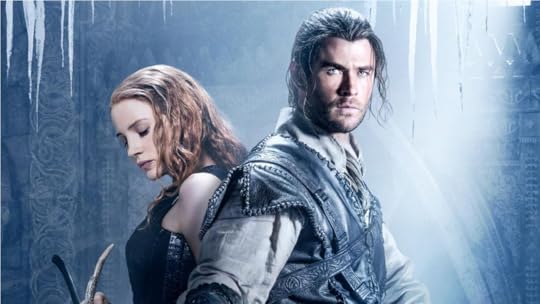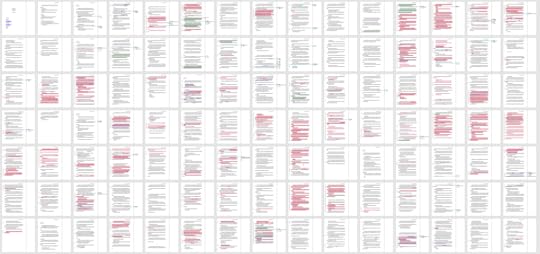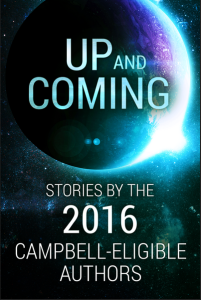S.K. Dunstall's Blog, page 33
April 23, 2016
Keeping your characters in character
We’ll all be rooned,” said Hanrahan,
“Before the year is out.”
John O’Brien, from the poem Said Hanrahan
Australian’s have a distinct way of speaking. Like other nations, our accent is becoming more generic, but it still has a distinctive flat tone.
Back in the mid-1960s, Alistair Ardoch Morrison, writing as Affabeck Lauder (get it*) took our accent to extremes and wrote two books about it, the first of which was Let Stalk Strine.
How much is it became emma chisit, decimal currency became dismal Guernsey, and Sydney became Sinny.
If you want to convey an Australian in your book you wouldn’t write it filled with the over-the-top accents from something like Let’s Stalk Strine. You’d normally try to find a word or two to convey the accent.
One such word used to be ‘mate’. Memo to all you people out there who use it. Yes, some Australians do say, “Mate.” More than most of us realise, in fact, but it’s actually a heavy word, and if you use it more than once or twice it comes across as a parody.
So an occasional, “Look, mate,” might convey an Australian—or equally, someone from the UK—but sprinkle ‘mates’ liberally throughout the book and your Australian is nothing more than a caricature.
Heavy-handedness kills believability dead. When writing characters with accents, or with distinct ways of speaking, we’re often told to go softly on the accent, use one or two words to emphasise. A single word usually suffices. “Rooned”, for Irish Hanrahan, for example, in the John O’Brien poem, Said Hanrahan, works.
The trick is to make that word sound natural. ‘Gonna’ is a word commonly used to do this. Or ‘gunna’ if you’re trying to do it with an Australian accent. I’ve read stories where the author tries to make it sound as if their character is poor and uneducated. They change every ‘going to’ to ‘gonna’ (or ‘gunna’). It doesn’t work because every other word around it is in the author’s voice, and for many writers that’s an educated voice.
 I don’t know if this is Mildmay, or if it’s his brother, Felix. But Mildmay was a cat burglar, and this guy is on the roof, so I’m going to assume it’s Mildmay, (even if by this book he’s lame and probably couldn’t do this any more).
I don’t know if this is Mildmay, or if it’s his brother, Felix. But Mildmay was a cat burglar, and this guy is on the roof, so I’m going to assume it’s Mildmay, (even if by this book he’s lame and probably couldn’t do this any more).The ‘gonna’ jars, because an educated person does not normally contract their ‘going to’s’. Of course, in real life. people do. The vice principal at my old secondary school used to say ‘gunna’. But he spoke well. I bet when he wrote it down, however, he wrote ‘going to’.
And speaking of poorer people, why do so many people try to write them as stupid? (I’ve read a lot of that lately too.) They’re not. People across every socio-economic status have a range of intelligence. Some of them are stupid, some of them are smart.
Actually, if you want to see how someone presents a truly smart person who comes from a disadvantaged background (and sounds like it), try Mildmay from Sarah Monette’s Doctrine of the Labyrinths series. I love Mildmay, he’s one of my favourite characters ever, and he’s a truly smart man.
“You don’t got to come if you don’t want.”
…
The lock was gorgeous, the work of Selenfer and Kidmarsh, who’d been the hot boys in locks back in the Protectorate of Helen. I ain’t much of a cracksman, not for the fancy stuff, but I could handle an old S-and-K combo. I was glad there was nobody standing behind me with their pocket watch, the way Keeper used to, but it wasn’t no trouble.
Melusine, Sarah Monette
Now that’s how you do it.
*Alphabetical order
And Let Stalk Strine translates to ‘Let’s Talk Australian’.
April 16, 2016
The Huntsman
 Jessica Chastain as Sara, and Chris Hemsworth as Eric in The Hunstman: Winter’s War
Jessica Chastain as Sara, and Chris Hemsworth as Eric in The Hunstman: Winter’s WarYesterday we saw The Hunstman: Winter’s War.
The reviewer in our local newspaper gave it one and a half stars.
I think they were a little harsh. I enjoyed the movie. I thought it was much better than the first one. Sure, it probably won’t win any Oscars, and it would have benefited from a deeper story. But the characters were great.
Ravenna (Charlize Theron’s Snow White’s stepmother) was probably the weakest character (although very in character from the last movie). Freya (Emily Blunt) was sympathetic, even if she did capture all the kids in the district and set them to fighting for her. Chris Hemsworth (Eric) and Jessica Chastain (Sara) were great.
In this prequel to the original I really liked the way the backstory for the first movie (Snow White and the Huntsman) was fleshed out and made whole. Great storyline, and totally believable. It all fitted together nicely.
Plus, it was nice to have a romance without all the usual angst. I mean, there was angst, but most of it was engineered by external parties, and there was a fair bit of trust in the relationship too.
And without giving too much away, there was also a measure of trust between many of the Huntsmen, who, let’s face it, had grown up together.
It was a nice little story. Just what I was in the mood for.
April 9, 2016
Starting a new story
 How we feel about our stories — stage by stage
How we feel about our stories — stage by stageIt’s starting to feel like autumn here in Melbourne, Australia. The other night, coming home, I smelled wood smoke for the first time. The nights are cool, even if the days are hot. We’ve started to turn the heater on more regularly. Not that we didn’t turn it on earlier this year, but that was irregularly. Last month there was one week where it was so hot we turned cooler on, two days after that it was so cold we turned the heater on, and two days after that we turned the cooler on again.
Daylight saving is over. We’re going home in the dark.
Now that we’ve sent the next draft of Confluence away, we’re both reading books. Lots and lots of books.
Binge-reading is fun, but you get to a stage where you read so much you become picky about the books you read. I set aside two good books part-way through because I wasn’t in the mood for them. I hope I go back to them, because both of them were good, they just didn’t interest me at the time.
Writing’s a bit the same. How you receive one of your own stories depends on your mood at the time.
Right now, we’re looking at old stories. At times we think, “Oh, I love this story. This character is so great, and it’s a neat story idea.” Other times we read the same story and all we can think of is, “This story needs so much work.”
Luckily for us, we tend to go through these stages at different times, so when I like a story, all Sherylyn can think about is the rewrites, and vice versa.
It’s fun, looking at the old ideas though. So many ideas already, so many new ideas. Waiting for the little spark that tells you this is the story you can live with for the months of writing it.
April 2, 2016
Nearing the end of the first round of rewrites
 The edits on the first hundred pages of Confluence.
The edits on the first hundred pages of Confluence.First round of edits
Mid-February our editor, Anne Sowards, returned Confluence with marked up with comments and suggestions for revisions.
Sherylyn and I talked through the main changes she suggested—storylines to cut/add, suggestions for improvements—and agreed on the basic changes we planned to make.
Then we started work. Sherylyn went through the story and added comments and highlights about the changes we wanted to make. I came along behind and started making those changes. When Sherylyn finished the initial mark-up, she went back to the start and began editing the changes I had made.
When I finished my changes, I went back and started editing her changes.
We do this in a single document. It’s shared on OneDrive. We show all revisions and comments. We have Anne’s comments scattered throughout as well, so there are three different reviewers that we’re trying to keep track of.
At the end of all this, we send two copies back to Anne. The first copy shows the revisions and the comments (just in case she wants to see what we’ve done and where). The second is a clean copy, with all revisions accepted, and all comments deleted. We’ve never asked if she wants the first one, we just send them both.
Hassles with Word
Around this time in the novel writing process we stop saying nice things about Microsoft Office and how handy the cloud is and start swearing at Word. And we save every five minutes (which makes things much worse), and swear at Microsoft again.
I like Word. I prefer it to Scrivener and any other word processing software I know of. As a co-author, I also like OneDrive, and the ability for multiple people to work together on the same document.
Word is incredibly powerful. It has its problems, however.
It struggles with a full 120,000-word novel with mark-up. Especially when the revisions and comments add at least another 30,000 words. And when the mark-up is across three people.
Toward the end of the revisions, which is where we’re at now, the changes we make are small. A couple of minor mods on every second page, say. But they add up, and we might do fifty or more pages in a day. That’s each person doing that. If we lose our work we can’t get it back. So we back up frequently.
Every night. Once onto the hard drive, once onto a flash drive, and once a week onto OneDrive itself. Paranoid? Us? Very. We have learned the hard way.
Word’s little foibles
I don’t even want to talk about syncing. Suffice to say, OneDrive gets itself into a twist occasionally and mixes up which file is the latest.
It doesn’t like people touching the same part of the document. If Sherylyn adds some text, then I update it by deleting part of it, next time we open the document Sherylyn’s text is back in all its glory. Along with mine.
Or if one of us adds a comment, saying, “Maybe we could fix this by …” and the other agrees, makes the change and then deletes the comment, next time we open the document that comment is back.
Lovely.
We’re nearly done
We’re almost complete. We’re about to change Australian spelling to US spelling. That’s scary, but the last two times we didn’t do it, and the poor copy editor had a lot of words to fix.
Once we send the rewrites off (due early April) we’ll start again with a nice, clean copy, all revisions and comments accepted, for the next round.
March 26, 2016
Pronouncing written words
 Seize the day
Seize the dayI worked full time while I studied for my undergraduate degree. It was back in the early days of off-campus study, and a lot of my subjects were done partly off-campus, with big chunks of lab time during the holidays.
I did a science degree. Applied science, which I confess I have never used. I started working in IT and I’ve spent most of my life working in IT.
The thing is, science has a lot of words that can be difficult to pronounce.
Some are easy. Trinitrotoluene and deoxyribonucleic acid are two I never had problems with. I could see the roots of each word and it’s a simple matter of sounding them out.
Even so, to this day, I am still more of reader of science words, than I am a speaker.
It’s not just science words. There’s a quote that goes around Twitter occasionally. Never make fun of someone if they mispronounce a word, it means they learned it by reading. That is so true. I find that a lot with Latin words. All my Latin has come from reading, not from hearing much of it spoken.
Take deus ex machina. The literal translation is “god in the machine”. This is from old Greek and Roman plays where the ‘machine’ was a crane held over the stage. There was a ‘god’ in the crane and he (presumably mostly a he) sorted out the plot.
It signifies a character who suddenly enters a story and provides a solution that couldn’t have happened otherwise.
When I was younger I always pronounced it ‘deuce ex ma-shee-na’. It’s actually pronounced ‘day-yoos ex mack-inna’. (That looks very Ocker written there, that’s how we’d say it with an Australian accent, anyway.)
The internet has been a boon. Want to know how to pronounce deus ex machina. Google it, with the word ‘pronounce’ at the end.
There’s only one problem, of course. Not everyone pronounces the word the same way. I used to pronounce carpe diem as ‘carp dee-em’. Now I have a choice of ‘kar-pah dee-em’ or ‘kar-pay dee-em’. It probably doesn’t matter much, except to a purist Latin speaker, but either kar-pah or kay-pay has to be better than plain old carp.
March 19, 2016
Cherryh: Which character am I – answers
Last week you were supposed to get the results of the Cherryh quiz, but we took a break to pay tribute to a great musician.
After I posted the EssGee Productions clip from Pirates of Penzance, I went back and watched the rest of the production on YouTube. It’s well done, and has some supremely talented comedians and comedic timing. All week I’ve had Frederick’s song, Oh, Is There Not One Maiden Breast running through my head:
Oh is there not one maiden here
Whose homely face and bad complexion,
Have caused all hope to disappear
Of ever winning man’s affection
…
if you will cast your eyes on me
However plain you’ll be, I’ll love you
Frederick does lack social skills.
Gilbert and Sullivan. Very clever, very catchy.
But, back to the quiz. If you haven’t answered it yet, check out the questions here first. Come back when you think you know the answers.
Answers
 I am drawn into a team testing prototype ships that travel at a significant percentage of the speed of light.
I am drawn into a team testing prototype ships that travel at a significant percentage of the speed of light.
Ben Pollard, and the novel was Hellburner. Ben and Dekker first appear in Heavy Time, when Ben and his partner come across the wreckage of a ship, and Paul Dekker, the sole inhabitant of the ship. In Hellburner they become involved in testing an experimental ship. I don’t reread Heavy Time much, but for some reason I come back to Hellburner a lot.
 I am stamped on the forehead by an alien as a message to tell humans to keep their hands off.
I am stamped on the forehead by an alien as a message to tell humans to keep their hands off.
The character is Procyon, from Forge of Heaven. This is another second book. The sequel to Hammerfall. Again, I reread the second book, but seldom look at the first, I don’t know why. The style is typical Cherryh. Slow for most of the book and suddenly, bang, the climax, and the book’s over.
Ariane 2, from Cyteen.
Spoiler coming up, so look away if you haven’t read Cyteen. I haven’t read Cyteen either. I plan to—one day—but I started Cherryh with Ben and Dekker and this was the book where I realised that their side lost the war.
Sort of. It’s more complex than that, and that’s not really the whole story, but that’s how I thought of it back then and I still can’t bring myself to read the book. Yet.
 I am the human representative to an alien race.
I am the human representative to an alien race.
Do I even need to say who this one is? Bren Cameron, from Foreigner, but will take any book in the Foreigner series. Book seventeen, Visitor, is coming out in April.
 I am the captain of my ship. I rescue a hairless alien and find he is intelligent
I am the captain of my ship. I rescue a hairless alien and find he is intelligent
Pyanfar Chanur, from The Pride of Chanur. A great alien viewpoint (and that’s Pyanfar herself, not the alien she rescues which turns out to be … well, spoilers). Refreshing, one of my favourites, but actually quite hard to buy now, especially as an eBook.
March 12, 2016
Dear Pirate King, we’ll miss your purple pants
Often when we write, we write to music. Sound tracks mostly. Hans Zimmer, James Newton Howard, John Wiliams. Sometimes we’ll do voices as well. Sarah Brightman, Enya, Era.
Occasionally, too, we listen to full soundtracks. Particularly Whistle Down the Wind and Paris.
The problem with both of these is that that people speak in between the songs, which can be distracting. But the music in between is fantastic.
Paris was written by Jon English and David MacKay. It’s brilliant, and I can’t remember which stories they were now, but at least one book, and part of two more, were written with John Parr singing his heart out as Paris in the background.
Sadly, it was never produced professionally, although we did see an amateur version of it here in Melbourne.
Jon English was part of my life growing up. First, as a touring rock star—he was one of the first rock stars I remember who toured our country town, and later when we were old enough to drive around the country chasing pub gigs, he was around too.
Later, on television, he was in shows like Against the Wind and All Together Now.
Even later still, when we started going to the theatre and he and Simon Gallaher put on their version of Pirates of Penzance. I don’t know how many times we saw Pirates. We loved it. Absolutely loved it.
The timing, and the way the cast worked, together made this show awesome. (And later the Mikado too, but always, especially the Pirates of Penzance.)
Every once in while you’d run into Jon English. Mostly at gigs. He was always approachable, ready to say a few words.
RIP Jon. You were a talented musician and an accomplished actor. And from what we saw of you, you were also a nice guy.
March 9, 2016
Up and Coming
 120 authors—who contributed 230 works, over a million words.
120 authors—who contributed 230 works, over a million words.Kudos to S. L. Huang and everyone involved in the massive effort to get Up and Coming: Stories by the 2016 Campbell Eligible Authors together.
Job well done, and in a very short time.
If you’re going to vote for the Campbell award this year, this is the place to start.
March 5, 2016
Time for a quiz: Which C. J. Cherryh character am I?
In honour of C. J. Cherryh being chosen as the Science Fiction and Fantasy Writers of America (SFWA, Inc.) 32nd Damon Knight Grand Master, here’s a quick quiz.
Who is the character, and from which book?
 I am drawn into a team testing prototype ships that travel at a significant percentage of the speed of light
I am drawn into a team testing prototype ships that travel at a significant percentage of the speed of light
 I am stamped on the forehead by an alien as a message to tell humans to keep their hands off
I am stamped on the forehead by an alien as a message to tell humans to keep their hands off
 I am the human representative to an alien race
I am the human representative to an alien race
 I am the captain of my ship. I rescue a hairless alien and find he is intelligent
I am the captain of my ship. I rescue a hairless alien and find he is intelligent
February 27, 2016
Starting with the wrong character
Linesman, Alliance and Confluence are Ean Lambert’s story. Yet we didn’t start book two, Alliance, with Ean’s point-of-view. We started it with the secondary point-of-view character, Selma Kari Wang.
We were worried how readers would react. In some ways it felt as if we were breaking a promise. We’d promised Ean’s story. Instead, they open the book and find Kari Wang. Only for the first chapter, mind, but how many pages does it take for a reader to decide they don’t want to read the book?
Half a page.
So why did we do it?
Chronologically, Kari Wang came first.
We had three ways to write the story. We could have written the scene as a flashback. But doing that took away a lot of the impact of the scene. It made Kari Wang distant, and less sympathetic.
We could have written it as a prologue. They’re not that common in sci-fi, but we do have them.
Hands up if you’re a reader who skips prologues. Sherylyn is. But there are other reasons we wouldn’t make it a prologue. To us, a prologue should be about something that happened a long time prior to the story starting. Timewise, the incident that opens the book happened at the end of Linesman. Add to that, the person it happened to is a point-of-view character.
The only other option was to write the story chronologically, which is what we ended up doing.
We think it works best, even if the poor reader does have to stop and wonder if they’ve opened the right story.
In other news
 Current status: Exhausted
Current status: ExhaustedIt’s been a busy week.
Alliance was released on Tuesday. So far, it’s been well-received, with some positive comments from people who’ve read it.
We’ve had a couple of guest posts. We’re linking to those as they come in.
There have also been lots of giveaways, both of Alliance and of Linesman. So many, in fact, that the our blog and twitter feeds are filled with ‘giveaway’ posts. There are two open at the moment. SF Signal for Linesman, and The Qwillery for both Linesman and Alliance.






